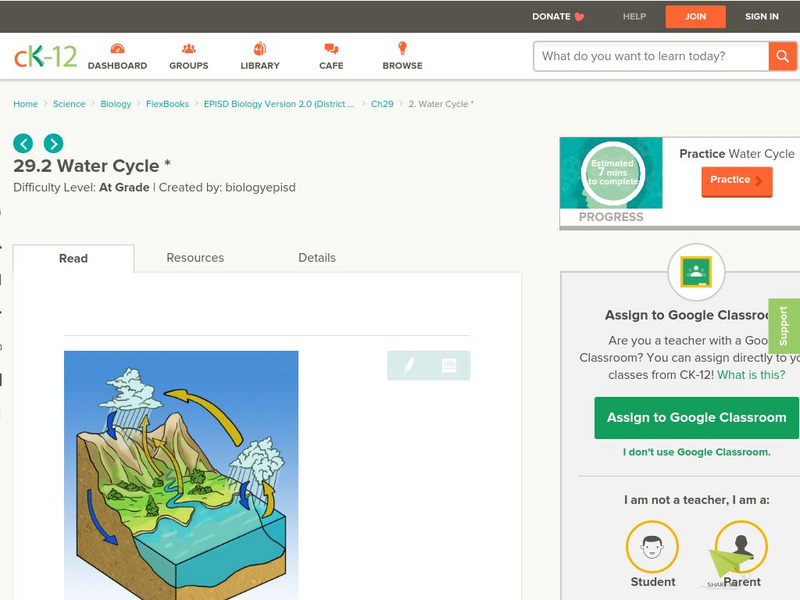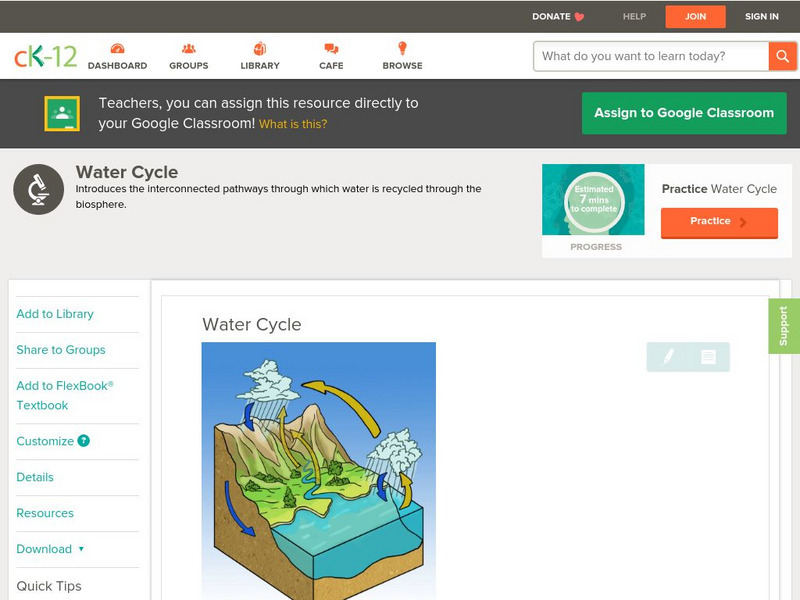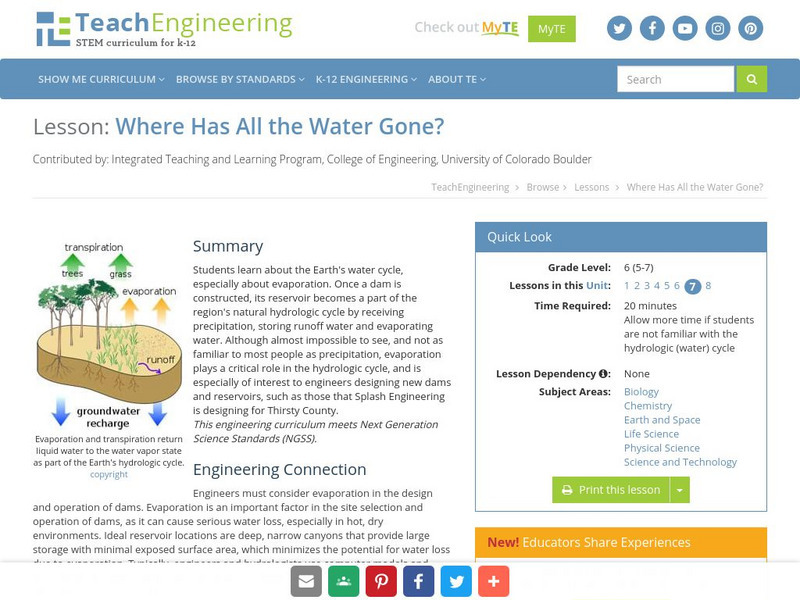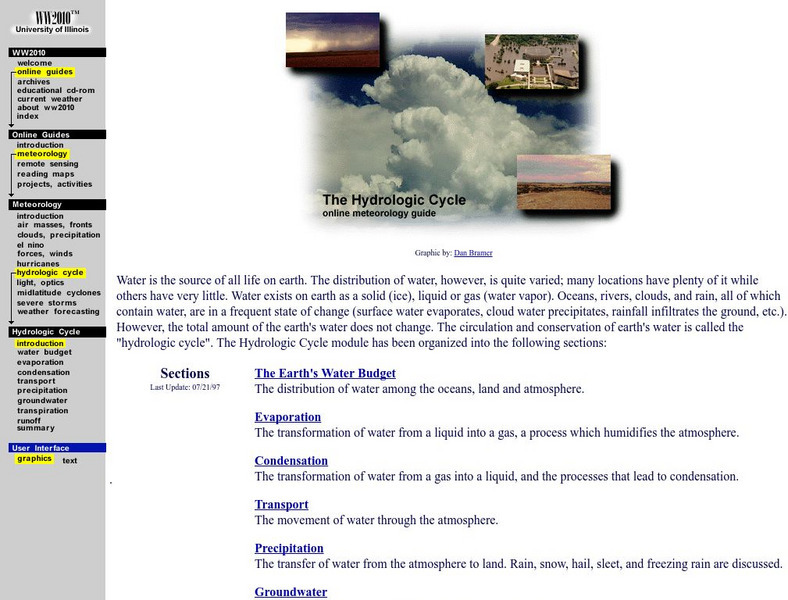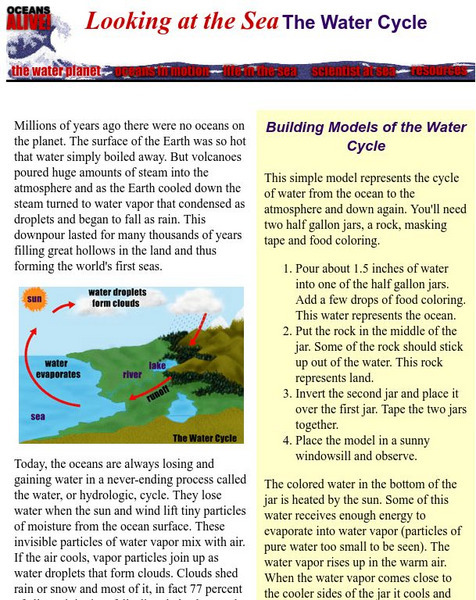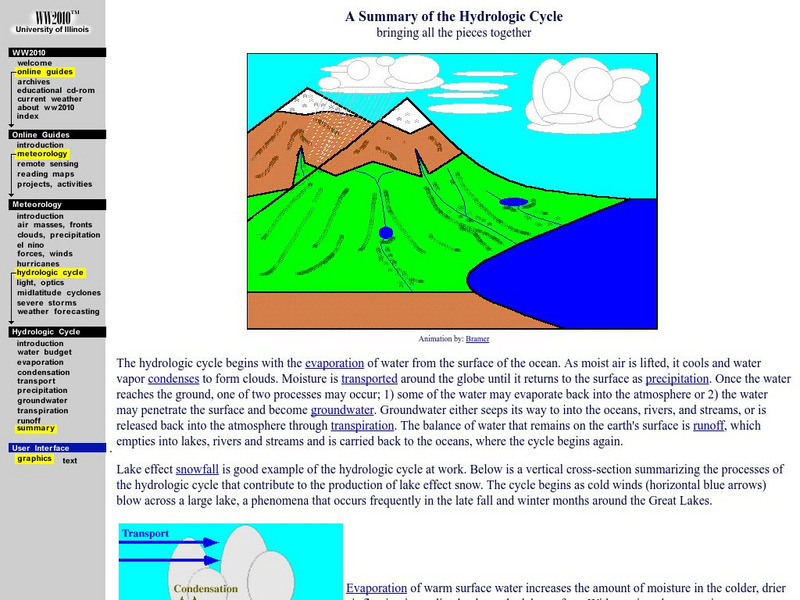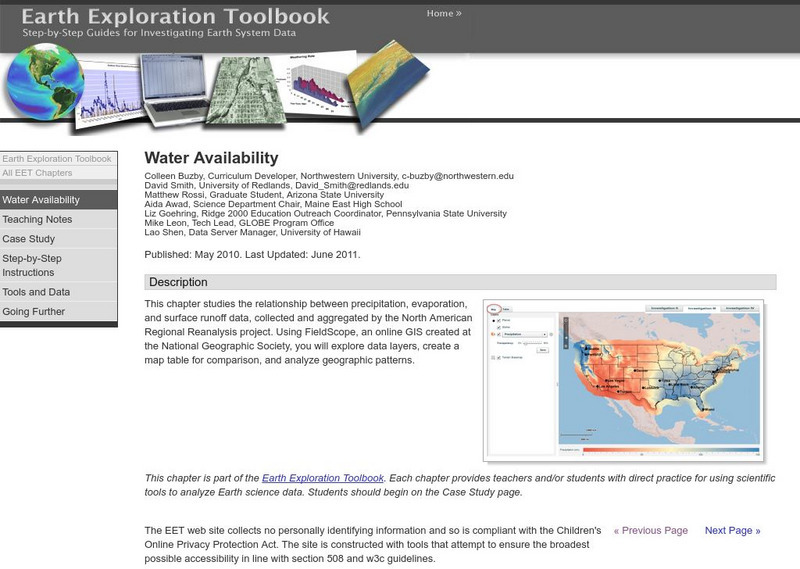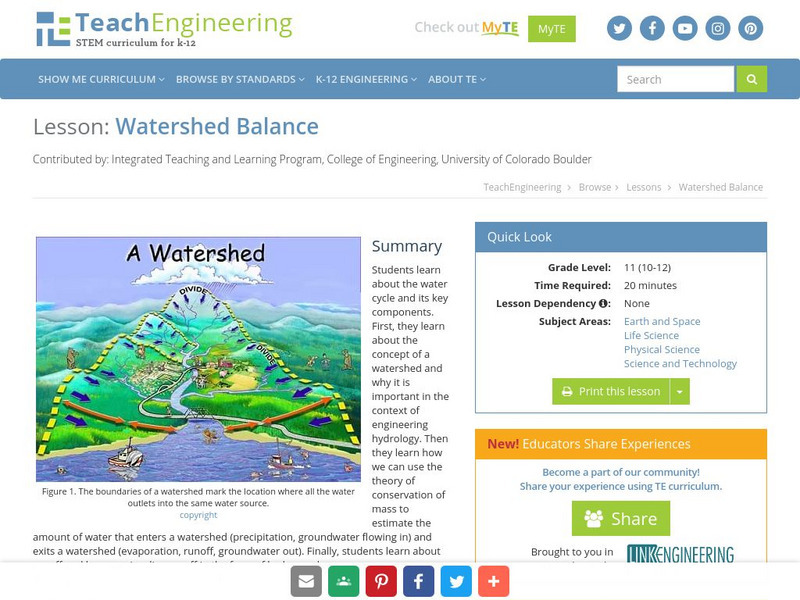Science Buddies
Science Buddies: Make a Miniature Water Cycle Model
In this activity, you will investigate some of the processes that make water move in and out of the atmosphere by making a miniature water cycle model inside a plastic bag.
Center for Educational Technologies
Earth Science Explorer: The Water Cycle
This is a very brief overview of the water cycle, but it does have a nice graphical representation.
CK-12 Foundation
Ck 12: Episd: Water Cycle
[Free Registration/Login may be required to access all resource tools.] An introduction to the biogeochemical cycle, the water cycle. Recognize evaporation, sublimation, and condensation. Identify groundwater and runoff water supplies.
CK-12 Foundation
Ck 12: Biology: Water Cycle
[Free Registration/Login may be required to access all resource tools.] Covers the water cycle.
Ministry of Education, Sports & Culture (Samoa) Government
Mesc: Samoa School Net: Rain and Water Cycle: Weather and Water Cycle
Explains the different stages in the water cycle while covering important vocabulary. Supported by lots of visuals and includes a good water cycle animation.
US Geological Survey
U.s. Geological Survey: Water Science for Schools
A collection of resources--pictures, maps, data, glossary--about water and the water cycle.
University Corporation for Atmospheric Research
Ucar: The Water Cycle
This site provides a comprehensive introduction to the water cycle. Students construct a model to simulate parts of the water cycle. Includes background information, links to standards, lesson plans, and assessment ideas.
TeachEngineering
Teach Engineering: Where Has All the Water Gone?
Students learn about the Earth's water cycle, especially about evaporation. Once a dam is constructed, its reservoir becomes a part of the region's natural hydrologic cycle by receiving precipitation, storing runoff water and evaporating...
Alabama Learning Exchange
Alex: The Water Cycle
This is a hands applied lesson plan to help students experience the water cycle on a smaller scale. Because of the hands-on nature of the lesson plan, it works well to help students with a language barrier understand complicated vocabulary.
University of Illinois
University of Illinois Urbana Champaign: The Hydrologic Cycle
Water is the source of life on earth. It exists in many forms and is constantly changing. The circulation and conservation of earth's water is called the hydrologic (or water) cycle. Find out how water evaporates, condensates,...
Museum of Science
Oceans Alive: The Water Planet
Check out this simple overview of the water cycle and learn how to build a model of the water cycle.
CK-12 Foundation
Ck 12: Fifth Grade Science: Earth Science: Water on Earth
[Free Registration/Login may be required to access all resource tools.] Discusses water and where it occurs on Earth, gives an overview of the water cycle, and explains how the ocean is an integral part of the water cycle and is...
Curated OER
Math/science Nucleus: Water Cycle Animation
This animation, in a storybook format, discusses water and the water cycle.
Missouri Botanical Garden
Missouri Botanical Garden: The Water Cycle
This simple overview provides definitions of key terms in the water cycle and a diagram showing the path water takes in this cycle.
American Geosciences Institute
American Geosciences Institute: Earth Science Week: Water: A Never Ending Story
Students carry out a number of activities that demonstrate the concepts of evaporation, condensation, precipitation, and soil moisture and runoff. Then students construct a terrarium as a way to observe the water cycle. Immediately...
ClassFlow
Class Flow: Water Cycle
[Free Registration/Login Required] This is a science flipchart that reviews the stages of the water cycle and also ways in which the water cycle affects weather such as hurricanes and tornadoes.
CK-12 Foundation
Ck 12: Biology: Soil and Water Resources
[Free Registration/Login may be required to access all resource tools.] Covers soil and water resources and the threats to these resources.
Georgia Department of Education
Ga Virtual Learning: Water and Wind
This interactive tutorial discusses the flow of water on the surface and below the surface. You will learn about the causes and actions of wind, and how water and wind move sediment.
Other
Virtual Field Trip: Water/aquifers
This virtual field trip for middle school students looks at aquifers and their place in the hydrologic cycle. Students learn why and how it is important to protect the source of your drinking water and some unique details about the...
University of Illinois
University of Illinois Urbana Champaign: A Summary of the Hydrologic Cycle
Animation and text explain the water--or hydrologic--cycle, which is the process that water undergoes in nature.
Science Education Resource Center at Carleton College
Serc: Water Availability
This lesson helps young scholars discover the relationship between precipitation, evaporation, and surface runoff data. Using FieldScope, an online GIS created at the National Geographic Society, students will explore data layers, create...
NOAA
Noaa: National Weather Service: Simplified Hydrologic Cycle
The National Weather Service offers information on the processes that make up the water (hydrologic) cycle, including evaporation and transpiration, precipitation, run-off, infiltration, and percolation. Has a good illustration and...
TeachEngineering
Teach Engineering: Watershed Balance
This lesson teaches the concept of a watershed and why it is important in the context of engineering hydrology. Learners learn about runoff and how we visualize runoff in the form of hydrographs.
TeachEngineering
Teach Engineering: A Guide to Rain Garden Construction
Student groups create personal rain gardens planted with native species to provide a green infrastructure and low-impact development technology solution for areas with poor drainage that often flood during storm events.




